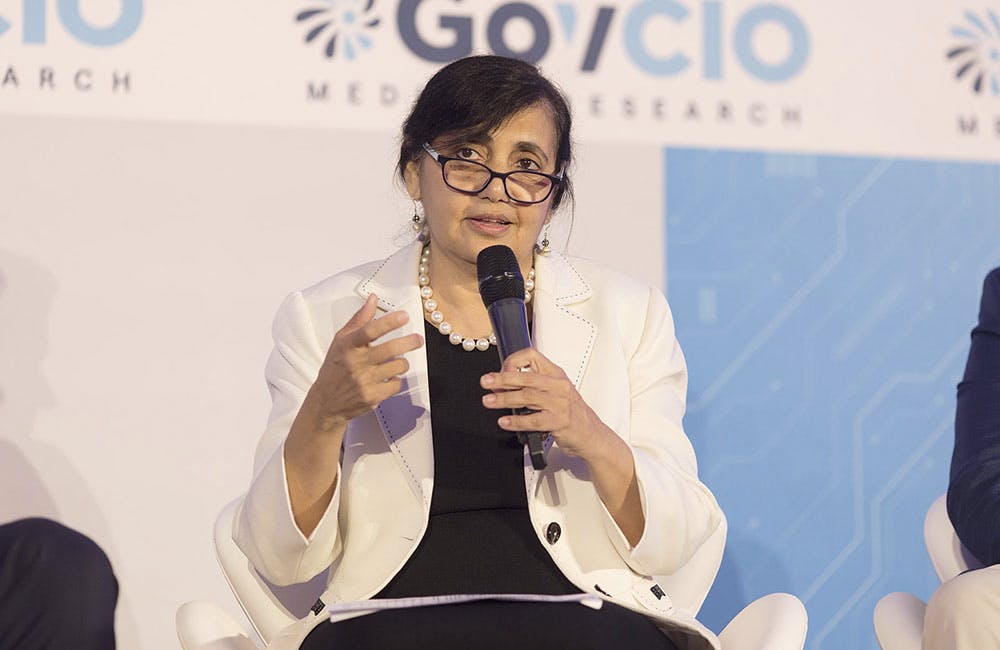How FDA is Approaching Change Management in New Data Efforts

The Food and Drug Administration is leveraging patient experience data for regulatory decision-making, with change management of its workforce key to the next steps in this digital transformation.
The effort stems from FDA’s June report, titled “Assessment of the Use of Patient Experience Data in Regulatory Decision-Making,” which outlines methods used to identify, collect and analyze patient data in decision-making.
“FDA will use this report to support its efforts to enhance the use of patient experience data in regulatory decision-making, which can help ensure that as a medical product is developed, it is developed in a way that takes into account the needs and priorities of the patients who will use the product,” Mary Ann Slack, director of the Office of Strategic Programs with FDA’s Center for Drug Evaluation and Research, told GovernmentCIO Media & Research.
Over the past year, FDA has accelerated data efforts to create modern data solutions like blockchain, genomic information and real-time analytics. The agency has experienced dramatic increases in data collection, especially following the onset of COVID-19.
“Technological advances have and will continue to revolutionize human and animal health,” Janet Woodcock, FDA’s acting commissioner, said during a budget hearing in June. “As a byproduct of these exciting advances, the amount and variety of data that FDA generates, needs and uses is rapidly increasing, but we’re often hampered by antiquated methods.”
FDA’s Center for Drug Evaluation and Research was, and continues to be, a central hub for FDA’s COVID-19 response and for patient data collection to ensure quick delivery of therapeutics for public health.
CDER’s new report provided recommendations to the FDA on how to better communicate and expand the use of patient experience data in regulatory decision-making with external stakeholders.
“The FDA is committed to improving collaboration efforts with drug-approving regulatory agencies in other countries, and to increasing transparency related to the scientific basis for drug approval decisions,” Slack said.
FDA is working across multiple fronts to support these data efforts and apply best practices, including collaborating on data standards through what it calls “standards development organizations.” This work has improved CDER’s data evaluation process and development of data standards policies.
Key to these efforts is change management to ensure the workforce is ready for the technology shifts. Slack noted that FDA needs continued buy-in from leaders and industry partners.
“Within the FDA, we are seeing a lot of interest in the inclusion of the patient perspective. Patient listening sessions and patient-focused drug development meetings attract a large number of staff from across FDA. There are multiple training courses that provide our reviewers with enhanced understandings of the methodologies behind the development of clinical outcome assessments or preference studies,” Slack said.
Change management for this effort includes the oversight and management of the entire portfolio of changes and process, including all the components of change control, Slack said.
In a “pharmaceutical quality system,” change management applies across the entire product lifecycle, Slack said. A company should have an effective change management system to evaluate, approve and implement changes. She said that the change management system should include:
- Quality risk management to evaluate proposed changes; the level of effort and formality of the evaluation should be commensurate with the level of risk.
- Evaluate changes relative to the marketing authorization, including current product and process understanding and/or design space, where established.
- Expert teams, with appropriate expertise and knowledge, should evaluate proposed changes.
- Evaluate changes after implementation to confirm the change objectives were achieved.
“Of course, there are challenges, and the report on patient experience data really captured some of them. Not all staff are comfortable with [clinical outcome assessments], and not all of the patient experience data we receive are of sufficient quality to be used for regulatory decision-making. But we are moving in the right direction,” Slack said.
This is a carousel with manually rotating slides. Use Next and Previous buttons to navigate or jump to a slide with the slide dots
-

The Next AI Wave Requires Stronger Cyber Defenses, Data Management
IT officials warn of new vulnerabilities posed by AI as agencies continue to leverage the tech to boost operational efficiency.
5m read -

Federal CIOs Push for ROI-Focused Modernization to Advance Mission Goals
CIOs focus on return on investment, data governance and application modernization to drive mission outcomes as agencies adopt new tech tools.
4m read -

Agencies Push Data-Driven Acquisition Reforms to Boost Efficiency
New initiatives aim to increase visibility of agency spending, improve data quality and create avenues to deploy solutions across government.
5m read -

Data Transparency Essential to Government Reform, Rep. Sessions Says
Co-Chair of the Congressional DOGE Caucus Rep. Pete Sessions calls for data sharing and partnerships to reduce waste and improve efficiency.
5m read -

DOD Can No Longer Assume Superiority in Digital Warfare, Officials Warn
The DOD must make concerted efforts to address cyber vulnerabilities to maintain the tactical edge, military leaders said at HammerCon 2025.
4m read -

DHA CDAO Spearheads Master Data Catalog to Boost Transparency
Jesus Caban plans to boost DHA's data maturity through a new master data catalog, governance frameworks and inventory of tech tools.
5m read -

IRS Makes Direct File Code Public as Lawmakers Debate Program’s Fate
The agency sees the Direct File source code as beneficial to government digital services despite what happens with it in proposed budgets.
5m read -

A Look at Federal Zero Trust Transformation
Recent developments from CISA and DOD show how government is advancing zero trust quickly.
20m read -

New Army Acquisition Plan Cites Autonomy, Predictive Analytics
Officials outline how the Army Transformation Initiative signals a broader shift toward efficiency with tech and acquisition reform.
4m read -

DOE National Labs Launch New AI Tools for Operational Efficiency
The Energy Department's National Laboratories are using AI to increase operational efficiency and drive research efforts forward.
3m read -

Human-AI Collaboration is Key to Secure Government Systems
Former CIA security chief emphasizes training and international standards for effective AI implementation.
23m watch -

Air Force, Coast Guard Talk Data Security Efforts for AI Development
The services' AI initiatives include efforts like creating clean training data, countering data poisoning and bridging siloed teams.
4m read
















